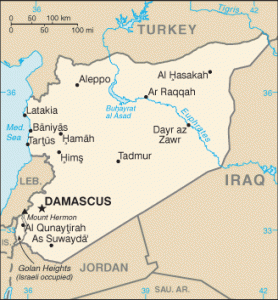The chairman of the United States Joint Chiefs of Staff warned that continued atrocities in Syria could make military intervention more likely, as the United Nations envoy Kofi Annan restarted negotiations in the capital, Damascus.
 In response to the massacre of over 100 people in the Houla area of central Syria, Gen. Martin E. Dempsey, the chairman of the Joint Chiefs of Staff, called said the “horrific” and “atrocious” act could prompt a military intervention, but warned such a policy may cause more havoc.
In response to the massacre of over 100 people in the Houla area of central Syria, Gen. Martin E. Dempsey, the chairman of the Joint Chiefs of Staff, called said the “horrific” and “atrocious” act could prompt a military intervention, but warned such a policy may cause more havoc.
“There is always a military option, but that military option should always be wielded carefully,” General Dempsey said. “Because one thing we’ve learned about war, I have learned personally about war, is that it has a dynamic all its own — it takes on a life of its own.” Nonetheless, he said, “it may come to a point with Syria because of the atrocities.”
UN envoy Kofi Annan, now back in Damascus, is trying to revive his failed peace plan. “I urge the government to take bold steps to signal that it is serious in its intention to resolve this crisis peacefully, and for everyone involved to help create the right context for a credible political process,” Mr. Annan said on Monday.
Annan explicitly stated that moving towards a ceasefire and a just political process is the responsibility of not just the Assad government but of the opposition fighters too.
Washington has already begun providing lethal and non-lethal aid to the Syrian opposition, even as they contemplate additional support to those rebels they determine are not allied with al-Qaeda-linked militants. But the al-Qaeda elements running throughout the disparate rebel militias are impossible to pinpoint and even those not aligned with al-Qaeda have been shown to have committed serious atrocities.
George Washington University professor and Middle East expert Marc Lynch has argued that “arming the Syrian opposition, would likely spread the violence and increase the numbers of Syrian dead without increasing the likelihood of regime collapse.” Also, as we saw in Libya, “fighting groups will rise in political power, while those who have advocated nonviolence or who advance political strategies will be marginalized.”
A big part of why the Annan peace plan has failed is because foreign powers continue to intervene in Syria for their own benefit. Russia and Iran continue to arm the Assad government, just as the U.S. and its allies in Europe and the Persian Gulf arm and aid the insurgent militias. The aid emboldens both sides and hinders any viable peace.


